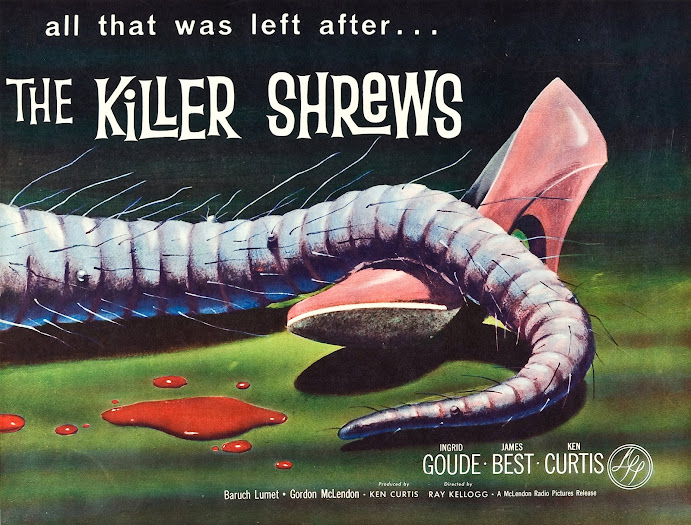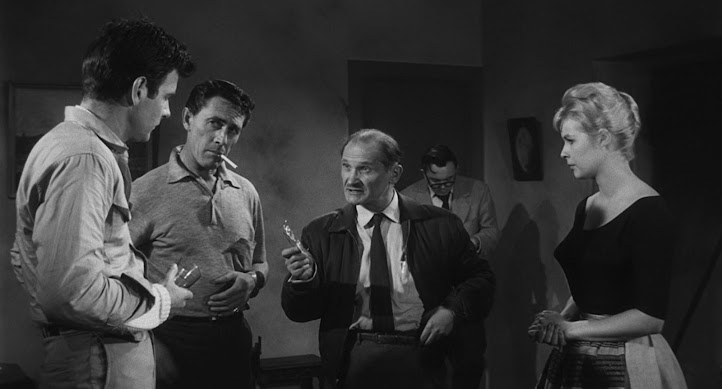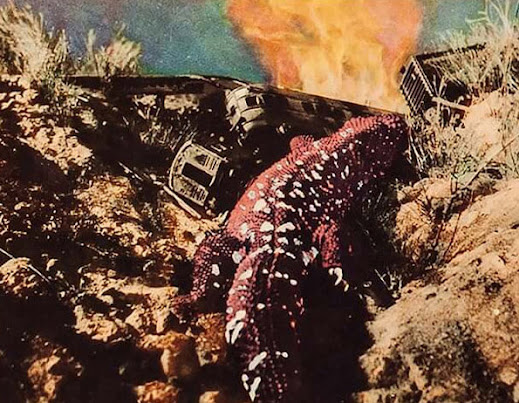More Blu-Ray Monsters Upon Us
The Giant Gila Monster and The Killer Shrews Make Good Combo Company
Interest sustains in The Giant Gila Monster and The Killer Shrews thanks to a newly released Blu-Ray combining the two, so please answer: Who’s buying them? Witnesses to then that was 1959 are at best seventy or over, a generation for nostalgia “Cruise Nights” my town used to host for auto buffs. Our “Jack’s Drive-In” of precious memory updated pole speakers so in-car diners could relive 50/60’s simpler time, these mowed down now that Jack's serves Mexican only, and under roof. Cruisers for most part sold their wheels or traded them for old-folk scooters like I see increasing number of. The Giant Gila Monster and The Killer Shrews are classified now as “howlers,” so wretched as to amuse, but to what degree … falling off the sofa, or but faintly? We have laughed at, or been instructed to laugh at, old monster pix for long as it’s been since Gila/Shrews was/were new, but in fact, I never found either funny in smug sense. Would only a fool admire these for overcoming limits to entertain way better than anyone could have dreamed at the time? Why not focus on what they do remarkably right? First of bouquets: the poster art. Gila/Shrews had brilliant posters, Shrews one-sheet current-selling in excess of a grand if you can find one. The why? is answered just by looking --- a woman’s shoe, puddle of blood, a tentacle draped over --- “all that was left after …” says the legend. Did independent producing Gordon McLendon hire Madison Avenue to compose this, or did a Texan pal have the brainstorm? Either way, it dazzles. So too does Gila, its claw reaching down for hot-rodders in screaming flight. “Only Hell Could Breed Such an Enormous Beast … Only God Could Destroy It!” There’s modern slant to this design, note simplicity, understatement if such a thing can be applied to The Giant Gila Monster. I hope this double feature gave plentiful profit, because the McLendons deserved it.
They were father/son radio and TV and theatres and you-name it entrepreneurs, breathless trade calling the McLendons “fabulously successful at everything.” Having derived from Texas stock that shot the works in all direction, old man McLendon and Junior figured they could do at least as good and probably better than films they booked. The pair were of sort John Wayne courted when he sought investors for The Alamo, except why give Duke money when they could throw dice themselves? Concept that was The Giant Gila Monster was on one hand absurdly simple, just kids (if overgrown, lead Don Sullivan thirty years old), rock and roll (Don rolled his own, and sang them), souped-up jalopies like Andy Hardy drove, and a blowed-up lizard to slither under miniature bridges and toy trains. Real-life record spinner of McLendon employ Ken Knox (who knew how far his voice travelled?) lent celebrity of sorts, the cast less known otherwise but professionals all as producers did their hiring in Hollywood to lend sheen, director Ray Kellog (for both pics) an old hand at weaving silk purse from pig ears. You gather by now my profoundest respect for this venture, much as was expressed for The Horror of Party Beach and Teenagers from Outer Space. Could home-based technology top the McLendons? Can our video smart phones smarten us up enough to shoot ten days in the yard and get result equal to theirs? Fun to imagine a Texas tornado resulting from success of Gila/Shrews, oil tycoons and varied got-riches dabbling in monster movies. Sounds like viable project for Jett Rink if beneath dignity of the Benedicts, so long as we assign filmmaking duty to fictional Longhorners.
Gordon McLendon wasn’t above “acting” in The Killer Shrews. In fact, he’s pretty good, reminding me a little of George Fenneman’s character in The Thing, Gordon putting performance where his money was. For the record, upward of $100K went into Gila/Shrews (for each, or both?). They sold the pair on state’s rights basis plus burning through venues family-owned, which were many, long time showmen who were McLendon friends willing also to take a flyer. At least at this level fewer got cheated, as I bet father/son canvassed Midwest houses and counted receipts themselves. Gila/Shrews would have been well into gravy by time of leaving these territories, and I wonder if the McLendons bothered with percentage deals on State’s Rights basis when lump sum payment up front would at least save them being rooked by remote managements. Let’s assume too that at least some American-International exchanges took up Gila/Shrews once the combo exited Texas and vicinities. AI peddlers knew paired B/W monster merchandise by ’59 was on ways out. Jim Nicholson had said so at trade gathers. Did Gila/Shrews canvas whole of a wide US? We know it played foreign because there are posters that survive, if not so creative as ours. Local Allen Theatre hosted a three-day run, followed a few days later by AI’s Sign of the Gladiator, Jim/Sam realizing times had changed, their strongman show a largest AIP hit yet. I was up Main Street watching The Shaggy Dog at the Liberty --- why didn’t older siblings or cousins take me to Gila/Shrews? I must ask if any remember the Allen's monster combo, to which they will doubtless look askance. Speaking of money and how it did or did not spread, I note Ken Curtis as “producer” for both Gila and Shrews. Does that mean he invested, bought an interest? If so, did he cash in when chips came, or end up like Alex Nicol and ilk who came up snake eyes for all of work making The Screaming Skull, and others such.
The Killer Shrews did at least command youth respect. Neighbor Babes Lowe, who in 1963 assured me that Natalie Wood danced fully naked in Gypsy, also swore that The Killer Shrews was among the most terrifying films ever made ... pity I had not seen it and likely never would, he added. This sort of thing happened a lot then (remember Tony in the lunch line swearing that a lion bit off a man’s head in Black Zoo?). Sobering realization … Babes and Tony have been gone now for many years. Those Killer Shrews lingered in my mind as something scary, and maybe that’s why I find them so even now, chiefly for creeper sound effect shrews make, and awful teeth the actor dogs were obliged to wear (local pets as monster threat). Once The Killer Shrews gets going, it is very intense. When toothy pooches pile on Festus, look out. What do outlaw horrors have in common with rock and roll, other than one being exploited by the other? The late fifties should be dubbed Invasion of the Small Labels, for like killing shrews, they were everywhere, feeding off mainstream makers of music and movies. These weren’t gnats to brush off, but innovators far in front of staid industry that in the case of records was still selling doggies in the window and doing films as though we had but lately passed Depression and war. I’ve been listening to a CD set called Rockin’ Bones (from Rhino) which is all “Rockabilly,” and sourced off tiny labels gone now but were once mover/shakers sniffing after hits or even misses that could earn, their little adding up to a lot, records cheap to produce and distribute. What pebbles in shoes these were for corporations that thought they controlled popular sounds. Look how RCA snapped up Elvis soon as he generated heat. Big sharks had to swallow little fish, and so it was with films. Playing time theatres gave to likes of Gila/Shrews was ongoing affront to establishment Hollywood.
Are The Giant Gila Monster and The Killer Shrews cult movies? I would say yes, for simple fact there is something innately appealing about Gila monsters and shrews. “Gila monster” fairly trips off my tongue. Does it yours? There was actually a sequel to The Killer Shrews, starring James Best, in 2012. I watched the trailer on IMDB this morning and came away desirous to see the feature. Are there McLendon family members who yet take pride in Gila/Shrews? I’m told the combo was among early totems of VHS collecting. There was TV exposure from Gila/Shrews being absorbed into an American-International syndication package announced June 19, 1963, “69 exploitable post-’50 films, titles available five years from theatrical release date.” Deal was for the group to run first on five ABC owned-and-operated stations, after which, on January 1, 1965, the sixty-nine would land on twenty other US stations that had bought in. The Giant Gila Monster and The Killer Shrews debuted among this group, the McLendons having made a deal with AIP to handle their properties, and of course, paying Jim/Sam a distribution fee. Our Channel 3 in Charlotte had a Friday night “Horror Theatre” slot to host the AIP’s beginning Jan.1 with The Day the World Ended. In March we got The Giant Gila Monster and The Killer Shrews, at which time I was finally able to determine if Babes had told me the truth about The Killer Shrews, reminded again that personal opinions are entirely subjective. Being lumped so long with AI’s made many assume Gila/Shrews were AI product. There are fans of sufficient fervor as to track down participants, like Bryan Senn who interviewed Don Sullivan of Gila fame, audio included on the Blu-Ray, a disc lavishly appointed and a credit to The Film Masters, new entity and future source for classic titles based on announcements they are making, theirs a crackerjack job transferring The Giant Gila Monster and The Killer Shrews, both wide and proud for a first time since 1959 playdates. By all means seek out the pair for an assured good time.










2 Comments:
James Best (six months before he passed) told me that he did SHREWS as a favor to his friend Ken Curtis and did it for scale.
Thinking of the earlier horror cycle: First, A pictures. Then, programmers for depression-era kids. Then, Shock Theatre delivered those movies to THEIR kids. Finally a sort of permanent on-the-radar status periodically spiked by mockery (The Munsters, trading cards with gag captions, dopey Mad House comics, etc.), nostalgia (beginning with aging depression kids), serious fandom, and attempted reboots that spur sales of the originals (Universal is still at it, even rebooting the Munsters multiple times).
Postwar scifi and scares repeated the cycle with variations. Those films reached 60s-70s kids on TV, slowly edging the older pics out of the perennial Shock Theatre slots. Later, nostalgia and mockery blended in college showings and Mystery Science Theater 3000 (which heckled both movies under discussion). The serious fandom, having grown into something like academia, included these newer products as they attained respectable vintage. Current buyers of the Bluray are likely remembering not the drive-in, but college town revivals and broadcasts, scented by cannabis and irony.
The biggest difference from the Monster Kid cycle: The genres went mainstream in a big way. The huge franchises are scifi, fantasy, and horror. At the same time, horror is still the go-to for budget filmmakers, now targeting small screens. Monsters and rocket ships have become not only respectable but inescapable.
Post a Comment
<< Home